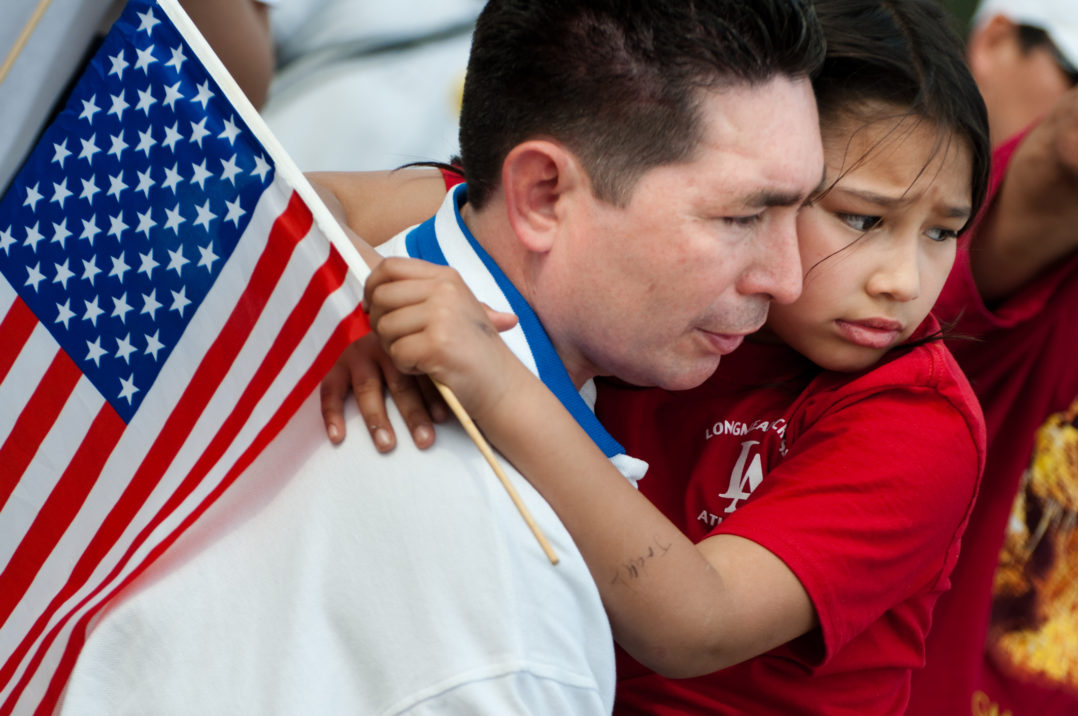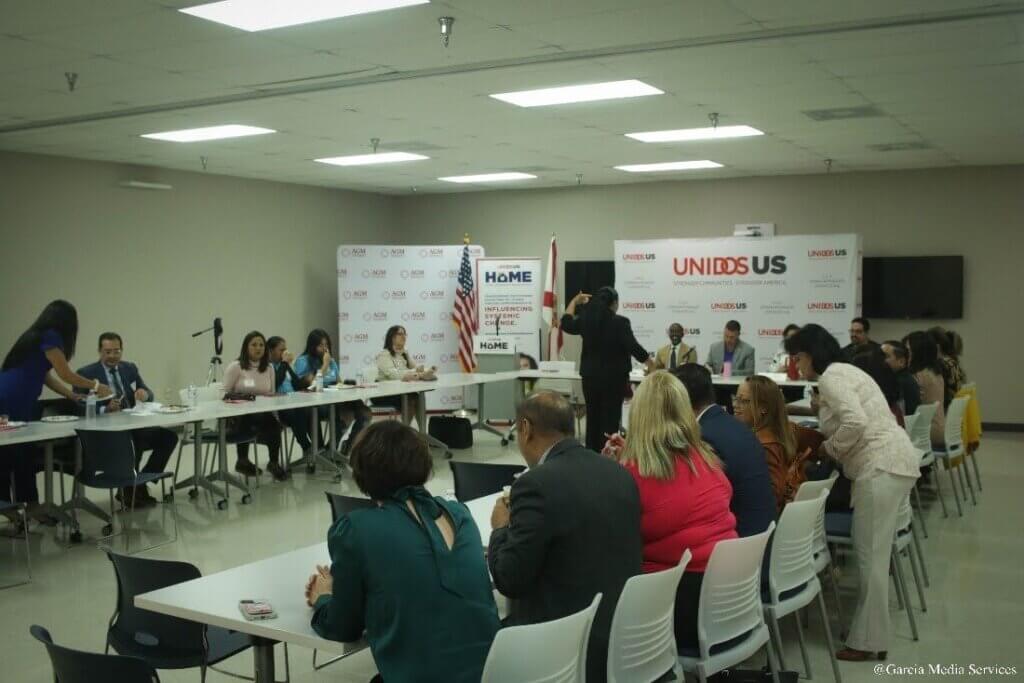What Families and Educators Need to Know About ICE Raids

All across the United States, immigrant families and their children are worried about when U.S. Immigration and Customs Enforcement (ICE) might be coming for one of them, and if they have the information they need to respond. Know-Your-Rights resources are one important way to manage the stress and be prepared.
The Trump administration has threatened that nationwide ICE raids could begin any time in the coming day. And on July 1, a new Florida law SB 168 went into effect that prohibits so-called sanctuary policies and punishes local governments and law enforcement agencies that do not share information on all detained persons with ICE.
During summer educational programs and as the new school year approaches, UnidosUS is reminding families that U.S. federal law guarantees all children the right to education regardless of their legal status. This means that schools are exempt from sharing information on their students. However, UnidosUS urges schools, community outreach groups, and families to keep in mind some immigration and enforcement facts that can affect students.
Here are some things to remember:
Schools are Exempt, But…
Federal law guarantees all school-aged children the right to education, and there is no law requiring ICE officials to enter schools. It is unlikely that ICE raids would directly target schools. This FAQ from the Fair Immigration Reform Movement notes that “school grounds are unlikely places for immigration raids. This is because both Customs and Border Patrol and Immigration and Customs Enforcement issued policy memoranda from 2011 that directs agents not to engage in enforcement activity at ‘sensitive locations’ unless there are exigent circumstances or prior supervisory approval.”
And while law enforcement officers sometimes do work within schools, Florida’s SB 168 exempts schools from sharing information about their students with ICE.
“The concern is that the school boards pay the police force for these officers,” says John Moreno-Escobar, Executive Director of the college-readiness YouVisit Foundation. He previously worked for the Broward County (Florida) School Board as director of strategic partnerships, answering to the Broward Superintendent of Schools.
“What I can tell you is that if security arrests a kid, (the officer) doesn’t follow school board guidelines, he has to follow the law enforcement guidelines so that’s going to be an issue,” Moreno-Escobar adds.
Data shows that this is an especially risky scenario for students of color. A 2018 report from the Department of Education’s Office of Civil Rights showed that during the 2015-2016 school year, black, Hispanic male, and Native American students were more.
And last December, the Trump administration rescinded school discipline federal guidelines that had been set up by the Obama administration to curb that tendency. In spite of this, schools still have the responsibility to uphold civil rights law that protects students from being discriminated against based on race, but groups like UnidosUS caution that racial biases remain.
“We are in an environment where students must be more careful in engaging in behavior in school grounds that could result in law enforcement arrest and trigger immigration action,” cautions Amalia Chamorro, UnidosUS Associate Director of Education Policy.
While students have the right to attend school regardless of their immigration status and SB 168 exempts schools from sharing information with ICE, these protections do not prevent law enforcement from sharing information with ICE if an arrest is made.
In fact, UnidosUS is concerned continuous anti-immigration actions and rhetoric could contribute to more erratic behavior among the youth affected by them.
“Children of detained or deported parents are at higher risk of depression and anxiety, emotional problems, negative self-esteem, attention disorders, speech delay, and low school performance,” notes the executive summary of the UnidosUS white paper “Beyond the Border: Family Separation in the Trump Era.”
Fears about raids and arrests—especially ones on the routes to or from a school—might also prompt students to stay home, adds Moreno-Escobar, noting that this can create several civil rights and security problems. For example, many of the children fleeing violence in their home countries are also living in neighborhoods affected by the very transnational gangs they’re trying to avoid. School absenteeism can put these children at higher risk of being targeted by gangs, or even being tempted or coerced into gang or other illicit activities.
“Not going to school exacerbates the exposure many of our youth already have in their neighborhoods, and that might put them into the criminal justice system,” Moreno-Escobar says. “We don’t want to see scared kids ending up down that road.”
In fact, the Beyond the Border executive summary also notes that in communities cooperating with ICE, Latino student attendance went down by 10%.
Another vulnerable student population is made up of recipients of the Deferred Action for Childhood Arrivals, which protects undocumented youth who were brought to this country as children. DACA recipients are supposed to be protected from deportation, but Moreno-Escobar says ICE agents often track them down in an effort to deport undocumented relatives since many DACA recipients live in mixed-status families.
“As a result, many of them are afraid to leave their parents or siblings alone at home, so they’re losing their jobs and not attending college,” he says.
Having a Family Action Plan in Case of Separation
Given these potential scenarios, it’s important for families to have a plan, and it should start with the very basics of how you interact with ICE.
For example, a series of three role playing videos from the National Lawyers Guild note that you do not have to let ICE agents into a house without a warrant to enter; that you are not obligated to speak to ICE agents or tell them anything about you if you have not been handed an arrest warrant, even if someone you are with is being arrested with a warrant; and that you should never sign anything in ICE custody without first speaking to a lawyer so that you know what you are signing.
Parents and their children should be prepared for a potential separation. The Immigrant Legal Resources Center suggests doing that with the following:
- Check to make sure all emergency contact information has been updated at your child’s school.
- Create a file that contains the above list of emergency contacts as well as any other important documents, then put it in a place where you or any other emergency contact person can locate it.
- In many states, you may complete an adult caregiver affidavit to temporarily put a person of your choosing in charge of your child’s care. Check in with legal resource clinics in your area to find out how do to this ahead of any potential detention. The Immigration Advocates Network has a National Immigration Services Directory, which is searchable by zip code. You can also use the UnidosUS ImmiLocal searchable tool to find immigration legal services providers.
- Regardless of whether your child was born in the United States, if you were born abroad, then you should register your child’s birth information in the consulate of your home country.
Florida’s Civil Rights Community and SB 168
Even before SB 168, the School Board of Broward County developed a local Immigrant Support Planto help shield its students and their families from ICE detentions. On March 7, 2017, the county’s school board adopted Resolution No. 17-98 designating their public schools district as inclusive, safe and welcoming. The We Are Broward Immigrant Support Plan was developed to guide discussions about diversity and culture which “instill in all students the opportunity to validate, respect, and benefit from the reward of living in a rich cultural society.”
“Protecting the safety and privacy of our students is a top priority for Broward County Public Schools,” says Vicky Saldala, Director for the Bilingual/ESOL Department. She notes the school system’s plan provides schools with important information and community contacts for its leaders, teachers, students, the community, and parents.
Among those is a brochure of free community resources in the district’s top four languages: English, Spanish, Haitian Creole, and Portuguese. These brochures are available at the front office of district schools and on its website.
“Schools should be safe havens that embrace all students and families, regardless of citizenship and national origin, and that includes unaccompanied and refugee children,” she says.
UnidosUS couldn’t agree more. In fact, this fall UnidosUS and its partners in the civil rights community will lead a Welcome Back to School campaign to raise awareness of the critical role schools play in civil rights protections and ensure that all schools can affectively include every student.
“We believe—and the laws of our nation affirm—that public schools are for every single child. In spite of the fear this administration is spreading, families across the country will continue to seek opportunity for their children through the education system,” says Maria Moser, UnidosUS Senior Director of Teaching and Learning.




